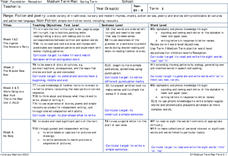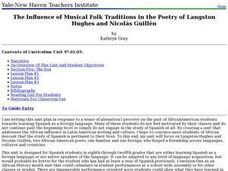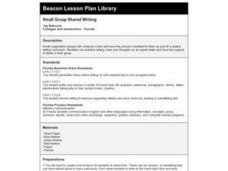Curated OER
Learning to Love That Poetry
Second graders listen to the novel, "Love That Dog." students reflect in a journal each day about the poetry form learned that day. They create their own poems following that format and have it for class the next day.
Curated OER
Poetry
Fifth graders read several poems by famous poets and identify what about their style makes them unique. They then analyze and compare poetic style, use of forms and themes. Next, 5th graders investigate and collect different examples of...
Curated OER
"Let Me Sing A Carefree Song Once More:" Poetry of Hidden Children
Students read various poems dealing with hidden children during the Holocaust. Using the texts, they discuss the poems meaning with their classmates. They present their information to the class taking turns on who is speaking. They...
Curated OER
Valerie Bloom Poetry
Learners listen to Granny Is, a poem by Valerie Bloom and discuss the metaphors in the poem. In this poetry lesson, students read poetry written by Valerie Bloom and discuss the techniques she uses. Learners write grandmother poems.
Curated OER
Teaching Money
Students identify the coins and bills used in the United States. They write the amounts of each bill and coin and practicing counting different amounts. They follow a demonstration about how to count money as well.
Curated OER
POEtry-A Close Look at Edgar Allen Poe
Students examine the life and works of Edgar Allen Poe. They are to analyze how his life influenced his writing. They create a website of the information they have found. They share their information with the class.
Curated OER
Cinematic Poetry
Eighth graders explore the genre of poetry through the creation of a multimedia presentation. Students write a poem and create an Avid presentation of their poem for the class. The poems and presentations are peer-reviewed.
Curated OER
Marriage of Visual and Thematic Aspects of Herbert's Poetry
Eighth graders describe the relationship between the visual aspects of "Easter Wings" and the poem's subject, and theorize about the poet George Herbert's motivations in constructing the poem this way. They demonstrate their ability to...
Curated OER
The Butterfly Project: Study and Response to Children's Poetry
Eleventh graders read various examples of poems of the humans behind the Holocaust and who perished during the event. Focusing on the number of children who died, they collect butterflies for the Holocaust Museum in Houston. They view...
Curated OER
Rap as a Modern Poetic Form
Students write and listen to rap songs. They discover how common themes in rap are indicative of the problems, as well as the empowerments, that can be seen in our urban cultures today. They discover how rap is actually an evolution of...
Curated OER
Review Poetry and the Simile and the Metaphor
Learners compile a list of the things they look for in a friend. Then they use that information to create a simple poem. Later they illustrate and display their poems.
Curated OER
The Band-Aid Counting Poem
Second graders listen to the teacher read a poem by Shel Silverstein and count the band-aids in the story.
Curated OER
Fiction and Poetry
Pupils explore fictional text and poetry. They explore the story structures used in the types of texts and examine the language patterns used. Students practice tracking text in the correct manner.
Curated OER
Poetry Describing Ordinary Life
Students examine the cultural and historical context which a poem is written in or describes. In this poetry lesson, students listen to an online recording of Philip Larkin reading "The Whitsun Wedding." Students explore how the poem...
Curated OER
THE FLOW OF MUSIC AND POETRY
Students explore their feelings about rain through art, music, and poetry. They listen to music as they think about rain and determine how they feel about rain. Students create either poetry or artwork about as they listen to music...
Curated OER
Poetry Sings
Students examine examples of literary terms in poetry. Then they choose two songs, write out the lyrics, and decipher what they think the artist is trying to say. Each student presents their song to the class and they cite examples of...
Curated OER
The Influence of Musical Folk Traditions in the Poetry of Langston Hughes and Nicolás Guillén
Students listen and explore how African-American culture relates to learning Spanish as a foreign language. Poetry, music, and history are utilized while learning about Langston Hughes and Nicolas Guillen.
Curated OER
Using History to Teach Tolerance: A Ripple of Hope
Students investigate the prejudice and racism that has existed in the U.S. for centuries by attending a field trip. In this equality lesson, students visit the Tolerance Museum and discuss the history of the U.S. Students write a poem...
Curated OER
Small Group Shared Writing
Learners discuss elements of effective writing in small groups. They work together to critique individual and group writing focusing on including supporting details.
Curated OER
"O Captain! My Captain!"
Who was Walt Whitman, and what link does he have to president Abraham Lincoln? After Lincoln's assassination, Whitman wrote "O Captain! My Captain!" This poem and "When Lilacs Last in the Dooryard Bloom'd" are the focus of exercises...
EngageNY
Making a Claim: Moon Shadow’s Point of View of the Immediate Aftermath
Body paragraphs are the building blocks of every essay. Pupils view and discuss a model essay using a rubric to evaluate one of its supporting paragraphs. Next, scholars use what they've learned to continue drafting their own literary...
Curated OER
Mountain Creation: A Drama Exploration
Students explore mountain formation. In this cross curriculum earth science and legend writing activity, students listen to the poem "The Way to make Perfect Mountains" by Byrd Baylor and identify examples of vivid language used....
Curated OER
Jack Be Nimble
Students recite the poem "Jack Be Nimble". In this poetry lesson, students read the poem and discuss other action words to use instead of jump. They rewrite the poem using their own name and a new action word.
Curated OER
Do You Haiku? We Do!
Third graders try their hands at writing Haiku, a form of Japanese poetry. Haiku is usually 17 syllables in three-line form. This engaging lesson has many excellent worksheets and website imbedded in the plan. They share their finished...

























